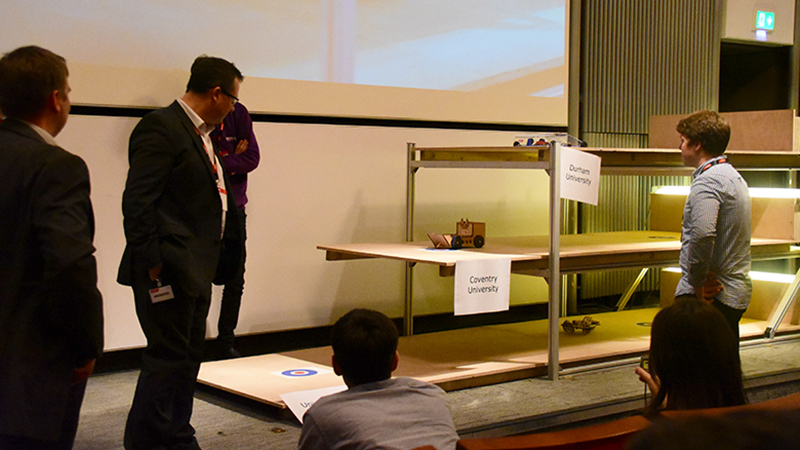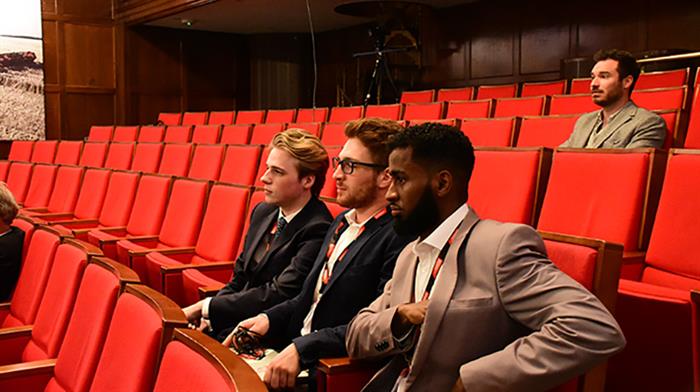
The Institution’s Design Challenge empowers teams of first-year mechanical engineering students to develop the design, build, team working, budgeting, project management and communication skills required in real-world engineering.
“Put simply, the Design Challenge develops the outstanding professional engineers of the future,” said Dr David Ball CEng FIMechE Eur Ing, founder and Chairman of the Design Challenge. “They undertake a complete and genuine project from start to finish and that’s one of the great things about the competition.”
This year’s finalists had triumphed in their university rounds and regional heats. They came to One Birdcage Walk to compete in the design, build and performance of a repeatable vehicle, delivery of a presentation and creation of a poster – all to strict specifications.
After a day of competition, the victorious team from Manchester Metropolitan University (MMU) was awarded the coveted David Ball Trophy. Brunel University London’s team was crowned winner of a second-year challenge.
The day's proceedings were judged by Gold Sponsor industry representatives from MOOG and 3M as well as Dr Colin Brown, Director of Engineering, and Dr Jenifer Baxter, Head of Energy and Environment, from the Institution.
Glynn Thomas, Chief Engineer Commercial Actuation, Moog Aircraft Group, was Head Scrutineer, who summed up the event:
“Creative thinking, ingenious solutions and great teamwork – an illustration of what young engineering is all about.”
David Ball added:
“There are many significant benefits of undertaking the Design Challenge. When you get to the Final, you have some of the people who are going to be the best graduates and the top engineers of the future, no question about it.
“It is often a criticism of graduates, that they have not gained enough experience of applying their knowledge before they start work – this competition was devised to overcome that specific hurdle. It is also an opportunity for industry sponsors to identify a young engineer’s potential for work placements, which are of great importance.”
Tom Owen, student project lead for the first-placed MMU team, spoke on behalf of fellow teammates Jonathan Ratcliffe and Alex Hermenean. He said the competition was inspiring and provided them all with fantastic practical experience:
“The challenges along the way pushed us to make decisions, communicate well and build on our teamwork. We got to speak with some industry sponsors at regional and national events which was a great opportunity. All of the speakers were inspiring and offered great insight into some of the directions that an engineer’s career might take. It was a truly great experience, full of opportunities, and we would recommend getting involved to anyone who may be interested next year.”
Ian Kennedy, Senior Lecturer School of Engineering at MMU was the winning team’s academic lead. He said,
“The competition demands innovation and creative thinking to meet the design brief and allows the students to apply classroom skills in a practical situation while learning time-management, persistence and group working. It has developed their skills in many areas in a manner that is clearly both stimulating and rewarding.”

Second-year competition winners, Brunel University's team, paying close attention to the first-year competition
Ilyaas Ahmed, Brunel University’s team leader, who won the second-year Design Challenge 2017, said that his team found the experience highly motivating and they were honoured to have received such a prestigious award:
“The Challenge enabled us to apply the theoretical knowledge gained in our degrees to a real-life problem within strict specifications. Having gone through the design process, we were forced to stretch our thinking and return to the drawing board on many occasions.
“We came away with a wide range of key industry-related skills, particularly presenting our design methodology to members of the Institution and guests from industry through the poster and verbal presentation."
David Ball said,
“After the challenge, students are equipped with a better method to approach an engineering challenge in the future. I am delighted that the Challenge is successfully embedded in the courses of many prestigious universities, and that industry welcomes its benefits too.
Sandra Balthazaar, Education Projects Manager for the Institution, added that the aim is to bring more universities into the Challenge:
“The Design Challenge is up and running in China and the UAE, and we are continually working to roll it out in many more universities. In the immediate future we are looking to grow the competition in the Scottish, Eastern and East Midlands regions of UK and in countries such as Pakistan.”